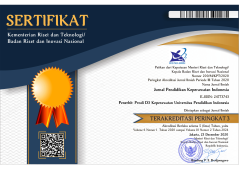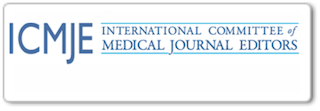Dilema Etik dalam Merawat Pasien Terlantar yang Menjelang Ajal di IGD
Abstract
ABSTRAK
Perawat IGD memiliki beban kerja yang lebih tinggi dibandingkan dengan perawat yang berkerja diruang lain. Kepadatan pasien di IGD selain mengupayakan keselamatan pasien, juga mengancam privasi pasien, dan membuat frustasi staf di IGD. Dilema etik sering dialami oleh perawat IGD dalam merawat pasien terlantar yang berada dalam fase menjelang ajal, namun tidak memiliki identitas. Fokus perawatan yang diberikan pada fase menjelang ajal dikenal dengan istilah End Of Life Care. Ketidakhadiran keluarga untuk mendampingi pasien dan tingginya beban kerja perawat yang tidak seimbang seringkali menyebabkan perawat tidak dapat fokus memberikan pendampingan menyebabkan timbulnya dilema etik. Tujuan penelitian ini adalah untuk mengeksplorasi makna dilema etik perawat dalam merawat pasien terlantar yang menjelang ajal di IGD. Desain penelitian ini menggunakan metode kualitatif dengan pendekatan fenomenologi interpretif, yang melibatkan 7 orang perawat IGD. Data dikumpulkan melalui indepth interview dan dianalisis secara tematik Braun dan Clark. Hasil penelitian didapatkan bahwa tiga tema yaitu: 1) Menyadari pasien terlantar menjelang ajal bukan prioritas pertama di IGD; 2) Bersikap profesional dan bertanggung Jawab; dan 3) Penerapan kebijakan yang menunjukan respect dan mendukung perawatan pasien terlantar. Kesimpulan: Kehadiran pasien terlantar menimbulkan dilema etik, perawat memaknai walaupun pasien tersebut bukanlah pasien prioritas tetapi harus bersikap professional dan bertanggung jawab. Dengan adanya dukungan dan kebijakan dalam penanganan pasien terlantar penerapan caring dapat tetap diberikan walaupun perawatan End of life care yang diberikan di IGD belum optimal.
ABSTRACT
Nurses who work in the emergency department have more workload compared to nurses who come from other departments. In the emergency department, the nurses not only have to struggle for the patients’ safety but they also need to deal with the patients’ privacy which is frustrating. Therefore, the nurses are often faced with many ethical dilemmas especially when they need to take care of homeless patients whose identity are not yet verified. The focus of the treatment is known as the End Of Life Care. The absence of the patients’ family members makes it harder for the nurses to focus on giving an assistance. As a result, ethical dilemmas may arise. The objective of this study, thus, was to explore the meaning of ethical dilemmas faced by the nurses when taking care of the homeless in the emergency department of RSSA Malang. Research design: this research employed a qualitative method using the interpretive phenomenology approach which involved 7 emergency department nurses. Data was collected through in-depth interview and analyzed thematically (Braun and Clark, 2006). Research Findings were categorized into 3 themes that are: 1) Recognizing dormant patients before death is not the first priority in the emergency department; 2) Be professional and responsible; and 3) Implementation of policies that show respect and support the care of abandoned patients. Conclusion: The presence of displaced patients raises ethical dilemma, nurses interpret the patient even though the patient is not a priority but should be professional and responsible. On the other hand with the support and policy in handling these abandoned patients so that the application of caring is given although the care of End of life care provided in the emergency department has not been optimal
Keywords
Full Text:
PDFReferences
Braun, V & Clark, V. (2006). Using Thematic Analysis in Psychologi. Qualitative Research in Psychology 3 (77-101).
Carnevale, FA., Chevrier, AS. (2011). Key issues in critical care nursing. In E. A. Jean-Louis Vincent, Frederick A. Moore, Patrick M. Kochanek, and Mitchell P. Fink (Ed.), Textbook of Critical Care (6th ed., pp. 1622-1626). California: Saunders.
Chaloner, C. (2007). An introduction to ethics in nursing. Nursing Standard, 21 (32), 42–46.
Christ, M., Grossmann, F., Winter, D., Bingisser, R., & Platz, E. (2010). Modern triage in the emergency department. Deutsches Ärzteblatt International, 107(50), 892.
Forero, R., Mcdonnell, G., Gallego, B., Mccarthy, S., Mohsin, M., Shanley, C., …Hillman, K. (2012). A Literature Review on Care at the End-of-Life in the Emergency Department, 2012. http://doi.org/10.1155/2012/486516
Jainurakhma, Janes, (2013). Study Fenomonologi Caring Perawat terhadap klien dengan Kondisi Kritis di Instalasi Gawat Darurat Dr. Saiful Anwar Malang. Universitas Brawijaya : Magister Keperawatan, Fakultas Kedokteran.
Lachman, V. D. (2012). Applying the ethics of care to your nursing practice. Medsurg Nursing, 21(2), 112.
Laporan Tahunan RSUD dr. Saiful Anwar Malang, 2014
Ose, M. I., Ratnawati, R., & Lestari, R. (2016). Studi Fenomenologi Pengalaman Perawat Instalasi Gawat Darurat (IGD) dalam Merawat Pasien Terlantar pada Fase End of Life di RSUD Dr. Saiful Anwar Malang. Jurnal Ilmu Keperawatan, 4(2), 171-183.
Oredsson, S., Jonsson, H., Rognes, J., Lind, L., Göransson, K. E., Ehrenberg, A., ... & Farrohknia, N. (2011). A systematic review of triage-related interventions to improve patient flow in emergency departments. Scandinavian journal of trauma, resuscitation and emergency medicine, 19(1), 43.
Song, J., Bartels, D. M., Ratner, E. R., Alderton, L., Hudson, B., & Ahluwalia, J. S. (2007). Dying on the streets: Homeless persons’ concerns and desires about end of life care. Journal of General Internal Medicine, 22(4), 435-441.
Tedjomuljo, S., & Afifah, E. (2016). Tingkat Pengetahuan Mahasiswa Keperawatan Tentang Kode Etik Profesi dan Caring. Jurnal Keperawatan Indonesia, 19(2), 129-137.
Watson, J. (2010). Caring science and the next decade of holistic healing: Transforming self and system from the inside out.
DOI: https://doi.org/10.17509/jpki.v3i2.9420
Refbacks
- There are currently no refbacks.
Jurnal Pendidikan Keperawatan Indonesia(JPKI) published by Indonesia University of Education. JPKI is licensed under a Creative Commons Attribution-ShareAlike 4.0 International License.
Office :
Nursing Department. FPOK UPI.
229, Dr. Setiabudhi Street. Bandung 40154
West Java , Indonesia
E-mail : jpki@upi.edu

_.png)
_.png)
_.png)











